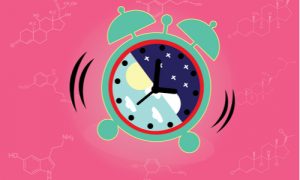The quality of your sleep has a distinct effect on your fertility. If you are looking to conceive, it’s important to avoid circadian rhythm disruptions.
Although there are many different factors that can play a part in your fertility, disruptions in your circadian rhythm are one of the biggest. If your goal is to get pregnant, it’s important to know about the direct relationship between your circadian clock and your reproductive system.
Circadian Rhythm Disruptions and Your Fertility
The human body requires an adequate amount of rest in order to properly function. Animals, including humans, have a natural sleep and wake cycle to function normally. This includes a number of processes, including the reproductive system. The circadian rhythm is responsible for regulating things like eating, sleeping and the production of hormones in the body.
When day shifts to night and it grows dark outside, the body naturally prepares for rest. However, when the circadian clock experiences a change, it can directly impact the woman’s fertility. Your chances of successfully conceiving are reduced. Even if an egg gets fertilized, circadian rhythm disruptions can dramatically reduce the chances that it develops into a healthy nine-month pregnancy. The circadian rhythm can also adversely affect your menstrual cycle as well.
Men may also experience fertility issues as the quality of their sperm can be reduced. When there’s a disruption in the circadian rhythm, he may have a lower sperm count as well, making it difficult to impregnate his female partner.
 How Light and Darkness Affect Fertility
How Light and Darkness Affect Fertility
A study was done looking at the way different times of the day can affect one’s productivity. Researchers examined female mice after they’ve mated with male mice. The females were divided into two groups after they were exposed to six hours more daylight than the other group. The findings saw that 20% of the female mice who weren’t exposed to additional daylight had bigger litters compared to the other group.
The researchers concluded that the body undergoes stress when there are circadian rhythm disruptions. As a result, a woman’s menstrual cycle can be affected as hormone production may be irregular. In turn, it may be more difficult to get pregnant. There may be additional complications like miscarriage and premature birth.
Activities That Disrupt Daily Rhythms
Certain activities can adversely affect the sleep-wake cycle and lead to disruptions of the circadian rhythm. Traveling, in particular, is very stressful on the human body, especially when there is a shift in time zones. Even going to a state with a one-hour time change can put enough strain on the body and disturb the circadian rhythm. This is why daylight saving time is also a detrimental factor. It interferes with the body’s internal clock and can result in irregularities in the menstrual cycle and the production of healthy sperm.
Medical conditions like anxiety, insomnia and restless leg syndrome can also affect your ability to get good quality, restful sleep. If you suffer from one of those conditions or have a different sleep disorder, you probably get far fewer hours of sleep than the body needs to function at its best. Generally, humans need around seven to nine hours of restful sleep.
Shift Work and Fertility Issues
One of the biggest factors that impact fertility is shift work. If you work during odd hours and have varying shifts throughout the week, it can affect your reproductive system and make it difficult to conceive.
Shift work falls under the hours between 7 p.m. and 9 a.m. Jobs in the military, healthcare and security industries are the most common types of shift work. Although many people are better able to adapt to their hours, others may find it challenging even after performing shift work for a while.
Shift work results in circadian rhythm disruptions that can adversely affect both women’s and men’s fertility. It may be more challenging for conception to occur or to carry a pregnancy to term if conception does occur. It’s common for women to experience irregular periods and irregular ovulation as well.
 Fertility Tips for Healthy Sleep
Fertility Tips for Healthy Sleep
There are certain tips that fertility experts recommend as aids in healthy sleep. This is important when you are trying to get pregnant. Fertility tips for healthy sleep include the following:
- Set a Routine Sleep Pattern: Go to bed and wake up the next morning at the same time daily. Avoid staying up all night or going to bed very late and binge-sleeping to make up for it.
- Take Up a Soothing Bedtime Routine: Bathe in a warm bath for an hour or eat a light snack before bedtime. Keep your bedroom at a temperature that’s comfortable for you and dim the lights to relax.
- Avoid Napping: Napping can disrupt your night’s sleep. Stay awake during the day and keep a normal schedule.
- Avoid Caffeine, Alcohol and Nicotine: Caffeine, alcohol and nicotine are stimulants that should be avoided, as they can interfere with your ability to get a good sleep.
- Exercise Daily: Exercise daily and make sure you don’t do it less than an hour or two before bed.
- See a Doctor for Sleep Issues: Talk with your doctor if you have sleep problems so that you can get treatment.
When you get regular sleep, your circadian rhythm will be level, your fertility will be improved and you can look forward to better chances of conceiving.

 How Light and Darkness Affect Fertility
How Light and Darkness Affect Fertility Fertility Tips for Healthy Sleep
Fertility Tips for Healthy Sleep


